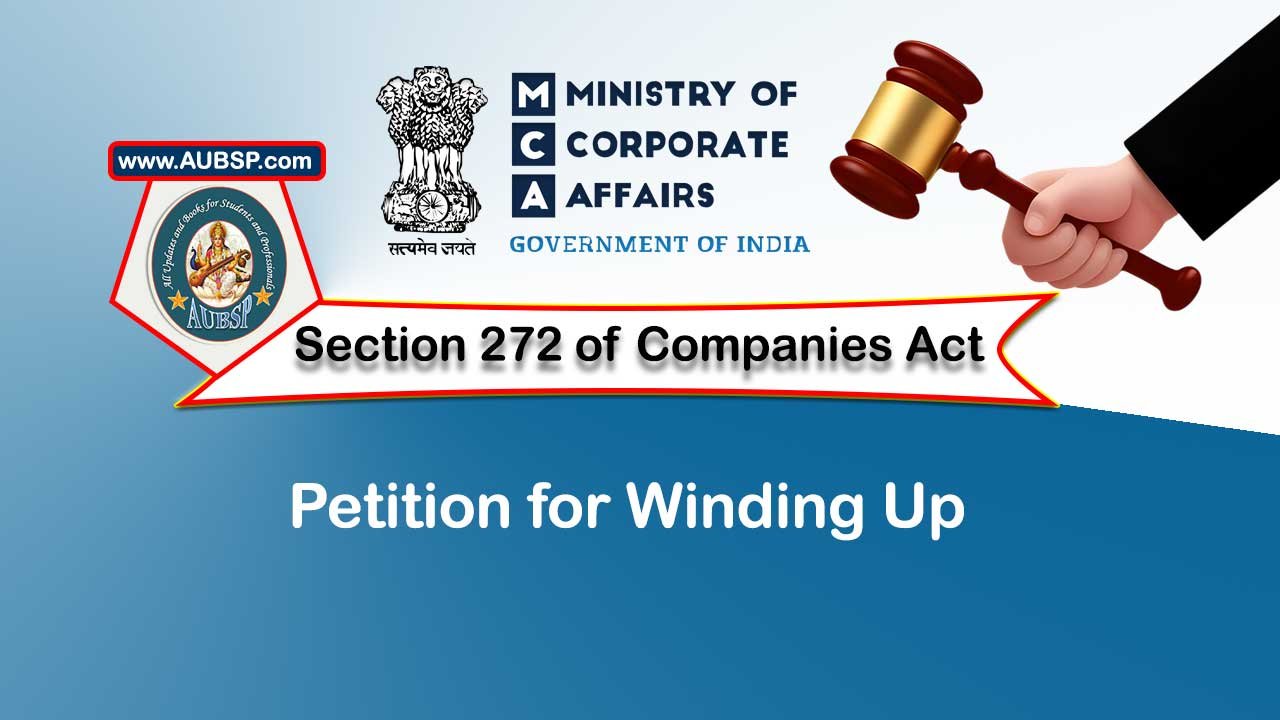Amended and updated notes on section 272 of Companies Act 2013. Detail discussion on provisions and rules related to petition for winding up.
Chapter XX (Section 270–365) of the Companies Act, 2013 (CA 2013) deals with the provisions related to winding up. Section 272 of CA 2013 provides for petition for winding up.
Recently, we have discussed in detail section 271 (Circumstances in which company may be wound up by Tribunal) of CA 2013. Today, we learn the provisions of section 272 of the Companies Act 2013.
The provisions of section 272 are effective from 15th December, 2016. You may refer Notification No. S.O. 3677(E) issued dated 7-12-2016. In this article, you will learn detail of the provisions of section 272 the Companies Act 2013.
| Name of Act | The Companies Act 2013 |
|---|---|
| Enacted by | Parliament of India |
| Administered by | Ministry of Corporate Affairs (MCA) |
| Number of Chapters | 29 |
| Number of Sections | 484 (470-43+57) |
| Number of Schedules | 7 |
| You are reading: | |
| Chapter No. | XX |
| Chapter Name | Winding Up |
| Section No. | 272 |
| Section Name | Petition for winding up |
| Monthly Updated Edition | Company Law PDF |
Section 272 of Companies Act 2013: Petition for winding up
Section 272 substituted pursuant to section 255 of the Insolvency and Bankruptcy Code, 2016 vide Notification No. S.O. 3453(E) issued dated 15.11.2016 and shall come into force on 15th December, 2016 vide Notification No. S.O. 3677(E) dated 07.12.2016.
(1) Subject to the provisions of this section, a petition to the Tribunal for the winding up of a company shall be presented by—
- (a) the company;
- (b) any contributory or contributories;
- (c) all or any of the persons specified in clauses (a) and (b);
- (d) the Registrar;
- (e) any person authorised by the Central Government in that behalf; or
- (f) in a case falling under clause (b) of section 271, by the Central Government or a State Government.
(2) A contributory shall be entitled to present a petition for the winding up of a company, notwithstanding that he may be the holder of fully paid-up shares, or that the company may have no assets at all or may have no surplus assets left for distribution among the shareholders after the satisfaction of its liabilities, and shares in respect of which he is a contributory or some of them were either originally allotted to him or have been held by him, and registered in his name, for at least six months during the eighteen months immediately before the commencement of the winding up or have devolved on him through the death of a former holder.
(3) The Registrar shall be entitled to present a petition for winding up under section 271, except on the grounds specified in clause (a) of that section:
Provided that the Registrar shall obtain the previous sanction of the Central Government to the presentation of a petition:
Provided further that the Central Government shall not accord its sanction unless the company has been given a reasonable opportunity of making representations.
(4) A petition presented by the company for winding up before the Tribunal shall be admitted only if accompanied by a statement of affairs in such form and in such manner as may be prescribed.
(5) A copy of the petition made under this section shall also be filed with the Registrar and the Registrar shall, without prejudice to any other provisions, submit his views to the Tribunal within sixty days of receipt of such petition.

